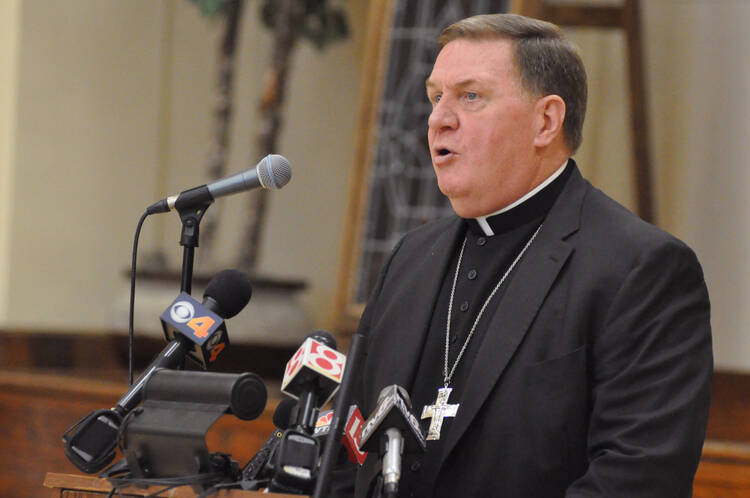“Well, she read in the newspaper that you pick up after yourself and you cook your own food and wash your own clothes,” Archbishop Tobin recalled telling him. “She’s had it up to here with the sort of monarchic church!”
The future pope laughed, and the remarks apparently made an impression.
“Whenever I’ve seen him since, one of the questions he immediately asks me is, ‘How’s your mother? Is she still alive? Does she pray for me?’” the archbishop said in an interview on Oct. 14 with America at the University of Notre Dame.
Ordained a priest in the Redemptorist order in 1978, Archbishop Tobin, who speaks five languages, worked in parishes in Detroit and Chicago. By 1997 he was head of his religious order, based in Rome, and in 2010 Pope Benedict XVI promoted him to archbishop, assigning him the task of managing the Vatican office that oversees religious life.
Around this time the Vatican had launched two investigations of Catholic sisters in the United States, apparently the result of the dissatisfaction among some church officials at what they saw as a drift away from traditional church teaching on contentious social issues among U.S. women religious.
Archbishop Tobin emerged as an advocate for the sisters. Archbishop Tobin believes that the investigation of the Catholic sisters has helped Americans understand the vital role that women religious have played in the U.S. church, and now in Rome, there is a sense of “appreciation and gratitude” toward American sisters among church officials.
He was soon after promoted to serve as archbishop of Indianapolis, traditionally not a premier post in the American church.
When he is elevated to the rank of cardinal on Nov. 18, Archbishop Tobin will be one of the most influential members among the U.S. hierarchy, one that has sometimes struggled to find its footing in the Francis era. He said one of the challenges facing the roughly 400 American bishops is communicating with one another.
Archbishop Tobin said it would be helpful to “develop a spirit of discernment among us, reading the signs of the times and places in the light of the faith, and being able to talk about that and asking ourselves, what is God’s will? Where is God opening a door?”
Archbishop Tobin cited the need for dialogue on a number of issues, including the question of women being ordained as deacons (the pope will eventually make the call), the rights of openly gay church workers (he suggests a case by case review, not a blanket policy) and how to implement the pope’s apostolic exhortation on family life.
Some bishops believe the exhortation that followed the synod, “The Joy of Love,” provides a route for divorced and remarried Catholic to be welcomed back to Communion, a position that Francis himself reportedly endorsed. Asked if he agreed, Archbishop Tobin reflected a bit.
“If we reduce that reflection, which is really the product of two synods, to a ‘yes’ or ‘no’ to this question or that question,” he said, “we’ve done violence to the text.”
But, he said, “What the Holy Father is proposing is a process of discernment as pastors with the people of God.
“That isn’t a fancy name for relativism or changing timeless doctrine,” he continued, “but a way of thinking of what it means to follow or lead a life of discipleship today.”







